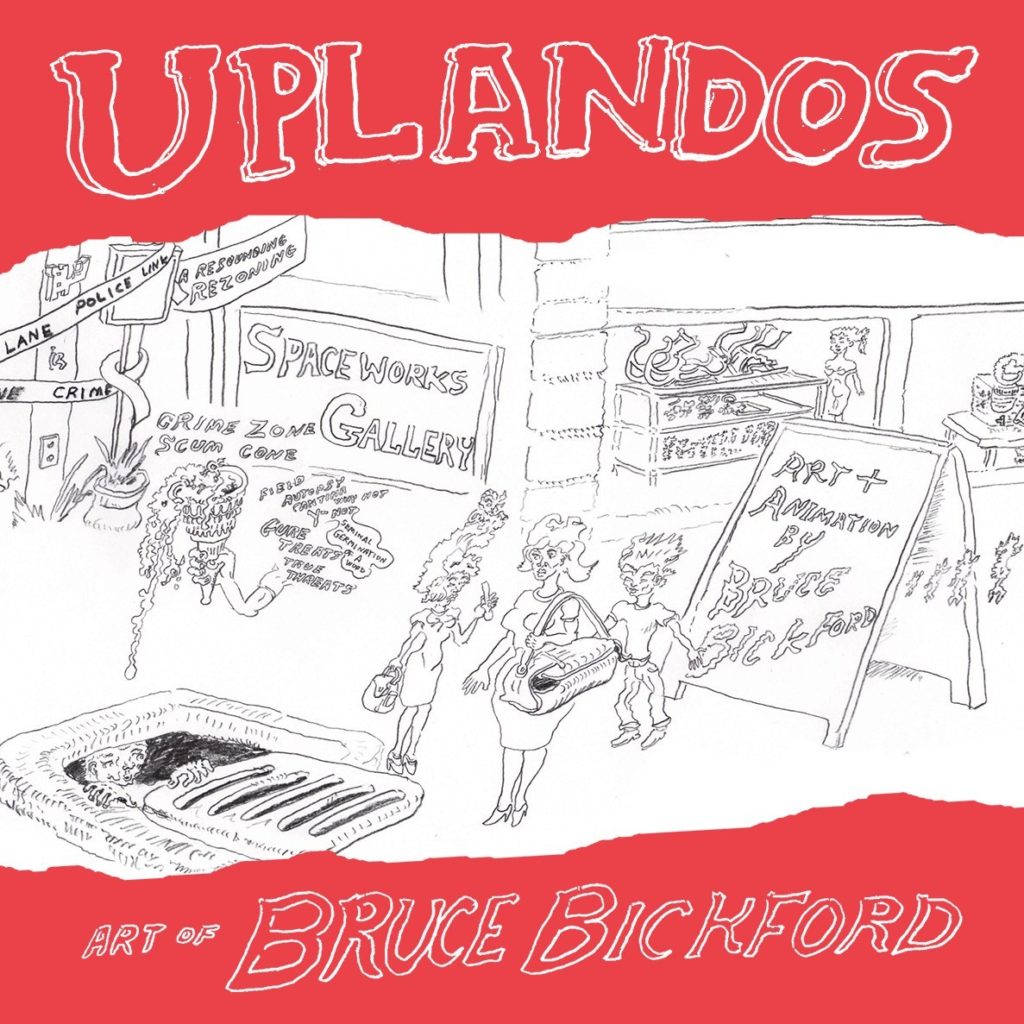A legendary animator with a loyal following finally gets his first exhibition in Tacoma!
EXHIBIT DURATION
May 18, 2017 – June 15, 2017
Curated by Nicholas Garaffe and Issac Olsen
A legendary animator with a loyal following finally got his first exhibition in Tacoma. UPLANDOS: Art of Bruce Bickford showed from May 18 – June 15th at Spaceworks Gallery and Bruce was present for both the opening and closing receptions.
Bruce Bickford, born in Seattle on February 11, 1947, grew up with his parents George and Audrey Bickford and his three brothers. At the young age of 12 or 13, Bickford, inspired by the movies of Ray Harryhausen, among others, got heavily into clay, experimenting with the material in a playful, yet highly imaginative manner.

In 1964, Bruce got his first 8-mm movie camera and started combining his passion for clay with a stop motion animation technique called clay animation. What started out as simple, almost crude films would soon develop into projects characterized by an almost obsessive attention to detail paired with surreal stream of consciousness stories. It is this combination that makes his work both so unique and so incompatible with mainstream culture.
After graduating from Tyee High School in 1965, he joined the U.S. Marines in 1966 and served until 1969, serving one year in Vietnam. Out of the military service, Bickford returned to his art, now equipped with a 16-mm camera, adding line animation, cell animation, and paper cut out animation techniques to his portfolio.

Bruce Bickford is not only self-taught but pretty much self reliant in the sense that he almost always works alone, on projects and stories he devises himself. Which has a profound influence on his output, as the painstaking detail of his work combined with the time consuming method of recording 24 individual frames for each second of film simply requires a lot of time. Perfecting and streamlining his trademark morphing, replacement and strata cut techniques helped speed up the process, but only a little, because at the same time his settings seem to have gotten more and more elaborate.
American musician and composer Frank Zappa recognized Bruce‘s talent early on. Cal Schenkel, a long-time Zappa collaborator who created a number album covers and animation work on Zappa‘s opus magnum “200 Motels” (1971) introduced the two in 1973 and Bruce went on to produce a remarkable amount of work for Zappa, work that was published in a whole number of Zappa-videos, including the Bickford showcase “The Amazing Mr Bickford“ (1987).
His work for Zappa did make him a cult-figure in the Zappa community, whose members are still among those to most readily recognize his work. He has also been called the father of the music video genre and a pioneering creator of clay animation. Titles he outright rejects: “I‘m just an animator.“
Returning to his home in 1981, Bruce went on to start production on a large amount of work, and he also started developing original story lines. Seven years later, he finally released a clay-feature, titled “Prometheus‘ Garden”, a 28- minute stop-motion film shot on 16-mm. “The film proceeded to blow the minds of critics, animation experts, and fans with its unrelenting onslaught of bewilderingly fast-paced, bizarre, morbid, yet nearly indescribable imagery – all created by Bickford out of almost-infinitely undulating forms of clay.“ Says director Brett Ingram.
Since 2004, interest in Bickford‘s work has continued to grow, aided by the award winning documentary “Monster Road”, produced by Brett Ingram, and by Bruce making an appearance at festivals and completing his feature “Cas‘l‘”, which took decades to make. Galleries and other venues in the USA and around the world have started exhibiting his work, making it accessible for a growing crowd, including younger animators.



You must be logged in to post a comment.